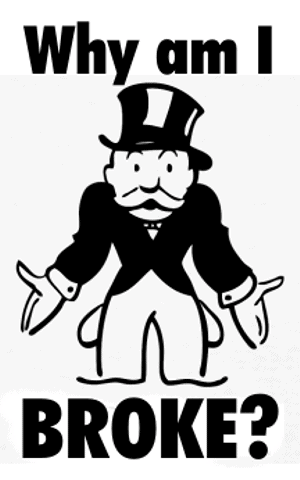
Back in 2006, I was broke. I just didn’t realize it. I believed a lot of the standard rhetoric.
- “You gotta have money to make money.”
- “You’re always gonna have a car payment.”
- “The little guy just can’t get ahead.”
Then I realized I had the wrong mindset. I resolved that I was broke, not poor. What’s the difference? Broke is just passing through. Poverty is a perpetual state of mind.
1. No written budget
Deficit spending may be standard operating procedure for Congress. But spending money they don’t have has lead the United States to $22 trillion in debt. To put that into perspective, if you spent a million dollars an hour since the birth of Jesus, you would still be about $5 trillion dollars short of spending that much money!
Using (and following) a written budget was the antidote to spending more than I earned. I like to think that I use my written budget the way I use MyFitnessPal. Eating everything that wasn’t nailed down made me fat for a while. Tracking what I put in my monthly cash flow plan was like tracking what I put in my mouth.
2. Abuse of credit cards
Credit cards are meant to be a convenience (and perhaps a safety layer) when making purchases. Over the past 30 years, credit cards have become synonymous to a bank loan to buy stuff you can’t afford.
According to Nerd Wallet, the average credit card debt was $16,425 in 2017. And creditcards.com tells us these consumers pay an average of 16.14%. This is a recipe for staying broke.
Rich people ask how much. Broke people as how much a month. Click To TweetThese banks have spent millions marketing credit cards to the general public. When a person uses a credit card, the card goes right back in the wallet. No pain registers. But research shows that when we spend cash, it actually registers in the pain centers of the brain.
3. No Rainy Day Fund
In 2017, CareerBuilder reported that 78% of people live from paycheck to paycheck. This means that about 4 out of 5 people we pass on the street are one missed paycheck from a “situation.” “Situations” are caused by not following a written budget (#1) and using credit cards (#2) as the rainy day fund.
Having an emergency fund, I call it a Freedom Fund, will prevent “situations” from occurring. Building this rainy day fund of 3-6 months of expenses has made “situations” into inconveniences I hardly notice.
4. No financial goals
Broke people usually can’t tell the banker what their net worth is. A common way of tracking financial goals is to monitor net worth. Is it going in the right direction? Is it static? Or worse, is it declining?
Net worth is how we know when we’ve hit our number. (Read my last article on retirement.) Tracking net worth monthly has helped us keep moving in the right direction. Asking ourselves the question, “How will this affect our financial standing?” has made all the difference in the world.
Setting the goal of becoming an everyday millionaire by age 60 and having frequent Dream Meetings has kept us motivated.
5. Not investing soon enough
And #4 leads me to #5. People usually start investing too late. In fact, most individuals by age 50 have less than $10,000 saved for retirement.
Investing for retirement should be thought of as a marathon. This is why I am always telling my high school students to start investing as soon as possible. I show them mathematically how investing just $100 a month starting at age 18 into a good stock market mutual fund (or ETF) can make them multi-millionaires at retirement! That’s the power of long-term compound interest.
Unfortunately for many, saving for retirement becomes a sprint to finish line. But until someone builds a time machine, we’re stuck playing they hand we have. So if you’re in the end of the third quarter (age 45-55), try to take advantage of the catch-up provisions of Roth IRAs, 401Ks, and 403Bs. You can still hit your number.
If you like this article, please share it with others.